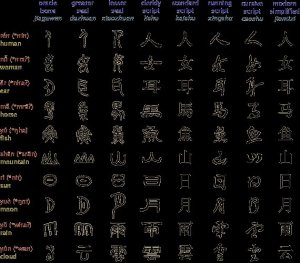While listening to a story about the revival of the Ukrainian language (naturally, in ex-soviet Ukraine) on the radio today, I was reminded of the immeasurable importance of the media we express ourselves in. I have always been fascinated by languages, amassing casual knowledge of three or four on top of my native Cantonese; the prospect of communicating with people from opposite ends of the globe was just too tempting to resist. Like other self-proclaimed enthusiasts, I typically view languages as vehicles of verbal and written exchanges, with the potential to be morphed into beautiful, eloquent art forms. But they are a lot more.
To the more inclined, languages provide direct links to cultures’ history, roots and particularities. They are also viewed as integral parts of people’s identity, and have often occupied the center stages of political contentions. Unfortunately, depending on geographic whereabouts and the socio-political contexts of the regions concerned, they can also form grounds for discrimination. By imposing—to varying extents—their mother tongues on colonial subjects, imperialists from the 17th to the 20th centuries (the Belgians, British, Dutch, French, Japanese, Portuguese, Russians and Spanish) not only sowed the seeds of modern global commerce and diplomacy, but also forever changed local and regional concepts about class and social dynamics: in many ex-colonies, the upper strata take pride in their mastery of the colonizers’ languages, while those who rely on indigenous dialects are often poor or despised upon. And I have yet to mention the tragic losses of entire traditional writing systems—Mayan variations, Vietnamese and Tagalog just to name a few.
The esoteric relationship between the Eastern Bloc and the Russian language has long been noted by casual observers and pundits alike. Although many ex-satellite states have reinstated their indigenous tongues as national official languages following the USSR’s dissolution, Russian still dominated daily affairs for much of the past twenty years, and was viewed by many as the language of sophistication; after all, decades of Soviet rule had left its marks. This, however, is changing. According to Kiev-based journalist Brigid McCarthy, Ukrainian is making a strong resurgence in the midst of Viktor Yuschenko’s movement to strengthen Ukraine’s national identity; it has become the language of choice of recording artists, and is considered fashionable by younger generations. What is interesting though, as McCarthy notes, is Russian’s persistent prominence due to the region’s cultural and political landscape; combined with the re-burgeoning Ukrainian influences, a peculiar cultural phenomenon arises. It has become commonplace to see soap and film characters converse in an amalgamation of Russian and Ukrainian. Subsequently, ordinary Ukrainians have become the products of Ukraine’s past and present; despite of their disdain for Russia and the country’s soviet ties, they have embraced facets of the Russian language as their own.
The circumstances of Ukraine is just one of many examples of what is happening worldwide. As nations and localities continue to engage in the tug-of-wars of identities, I am reminded of the role played by the various facets of languages—languages, dialects, accents, vernaculars—in the debates, or worse, conflicts at hand. Does it alter my desire to learn new languages? Hardly, but I may think twice about the meaning behind my language acquisition, and practice them with care, thought and sensitivity.
For this week’s fun edition of “The World in Words”, check http://www.theworld.org/

